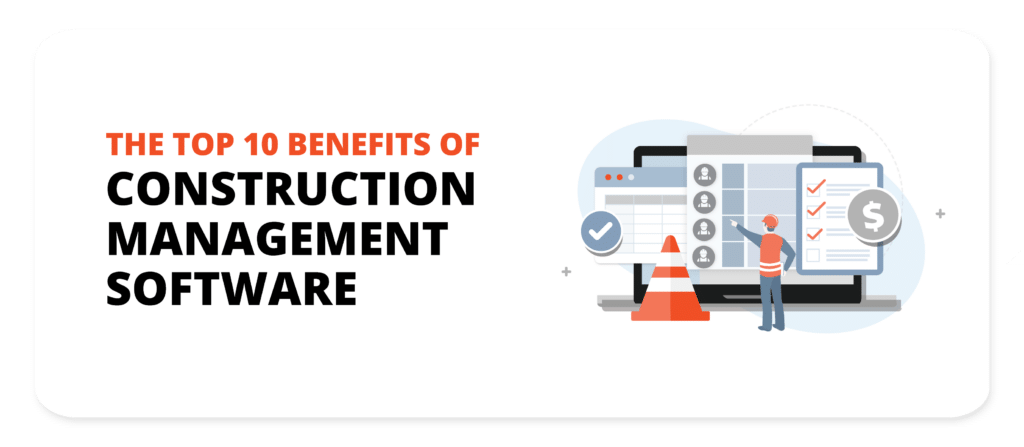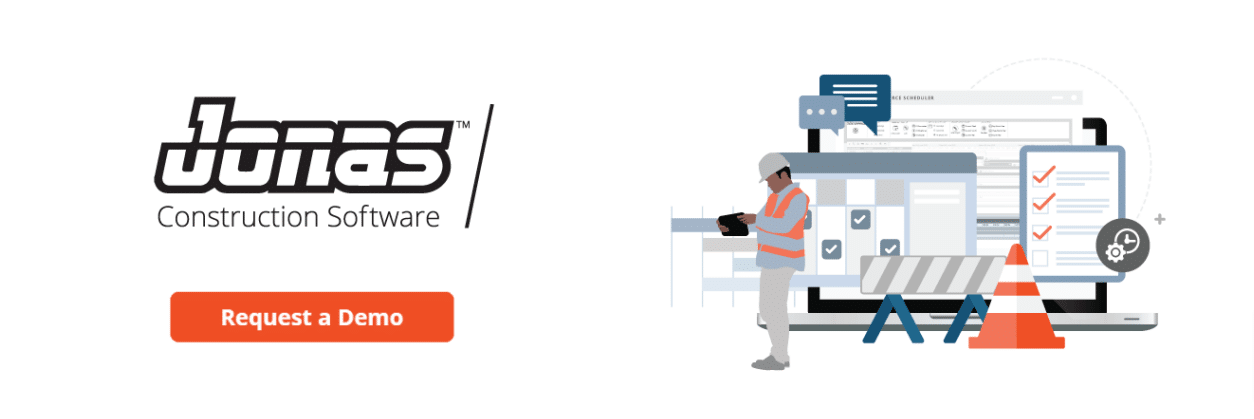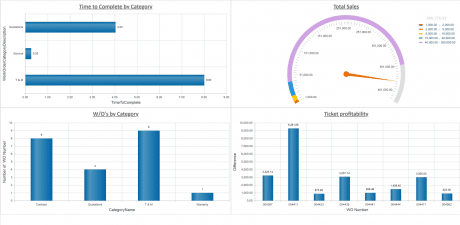Last Updated on July 15, 2024

In today’s complex construction industry, businesses face mounting pressure to improve operational efficiency and profitability while dealing with other industry challenges like labor shortages and rate hikes. This has raised the popularity of construction management software — modern and robust solutions that integrate various field and back office processes into a cohesive system to effectively manage construction project timelines, job costs, and budgets. In fact, the global construction management software market is projected to reach US$ 2.6 billion by 2028 with a CAGR (compound annual growth rate) of 8.2%, reflecting the demand and interest from construction businesses.
But before you adopt the new construction software, let’s understand what construction management software is and why you may need it. This blog will help you define what it is and address the key benefits of construction management software.
- What is Construction Management Software
- Why Should You Use Construction Management Software?
- The Benefits of Construction Management Software
What is Construction Management Software?
Construction management software is a specialized technology solution that empowers construction businesses to effectively manage projects, resources, and customers. With a wide array of functionalities, it automates and optimizes key project management tasks, such as daily internal communications, project scheduling, job costing, document management, and reporting. It can work with or without an internet connection, bridging the gap between the onsite construction crew and back office, project owner, and other stakeholders.
As a centralized hub for your field and back office operations, it seamlessly integrates various job processes, tasks, and data to reduce cost misallocations, duplicate entries, and inaccurate data. By doing so, job costs are more accurately allocated, providing better reports to make informed decisions; and ultimately, boosting operational efficiency and profitability.
Why Should You Use Construction Management Software?
Construction management software enables businesses to optimize workflows, enhance decision-making, mitigate risks, and achieve greater efficiency and profitability.
But how do you know it’s time to make a move towards a construction management solution? If you struggle with one or more of the following scenarios, it’s a sign that your business needs construction management software:
- Unsure of where your job costs are at.
- Struggling to identify and track cost overruns.
- Lacking confidence to make informed business decisions.
- Depending on disparate file storage systems to track project documents.
- Dealing with outdated or inaccurate data.
- Experiencing miscommunication or delays in information sharing from the field to the back office.
- Incomplete or inaccurate cost reports.
- Constantly running the risk of cost overruns, project delays, or subcontractors’ mismanagement.
- Struggling to manage project schedules effectively.
- Facing the challenge of safeguarding profits and maximizing returns on construction projects.
- Inefficient and siloed processes.
The Benefits of Construction Management Software
1. Job Costing & Cost Management
Construction management software provides you with the tools and features necessary to execute job costing and cost management effectively. It allows project managers to create detailed estimates and budgets for their jobs, so that they can get every dollar accurately allocated to different project components, such as labor, materials, equipment, subcontractors, and overheads. The project managers can record and monitor actual expenses against the estimated budget so that they can identify cost overruns, analyze variances, and take corrective actions promptly. It also provides comprehensive job cost and WIP reports, offering valuable insights into project financials and enabling project managers to save time and ensure proactive cost control.
2. Field Management
Construction management software enables field staff to update project progress and input critical data without having to visit the office. The software helps track important project data like daily logs, labor hours, equipment usage, expenses, etc. to ensure the project manager, field and back office staff are all aligned on project statuses and communications. Project managers can set up and track project milestones, monitor job resources, and view actual vs. estimated costs at any moment to help them make more informed and effective decisions.
3. Accounting Integration
While accounting integration is not included in all types of construction management software, it’s an important feature to be aware of if you are concerned with effectively managing your job costs and improving profitability. The benefit of construction management software with integrated accounting is that you can share information from the field to the back office immediately. Data such as labour costs, change orders, and purchase orders can flow directly to the back-office accounting system, to provide the most up-to-date accounting and financial information for reporting. An effective accounting integration in construction management software will also help automate accounts payable and accounts receivable processes by digitizing invoice management, payment processing, and billing. It also streamlines the process of allocating costs to the right accounts, which helps accurately track expenses and revenue on different projects.
4. Centralized Document Management System
With a document management solution integrated into construction management software, construction project managers can store, organize, and access project-related documents, drawings, and contracts in a centralized repository. This promotes efficient information sharing, reduces paperwork, and mitigates the risk of miscommunication or working with outdated information. It also supports team collaboration by allowing field and back office staff to share documents with project stakeholders, and project managers with controlled access and permission settings.
5. Accurate Data Flow and Allocations
Construction management software enable field personnel to enter data like purchase orders, job units, expenses and change orders directly from the job site in real-time, eliminating delays and double data entry. By doing so, job costs are more accurately allocated and efficiently processed by the back office. With integrated construction management software, the back office can rely on the most up-to-date WIP and cost reporting and data to know where their job costs are and make effective business decisions.
6. Improved Communication
With some construction management software offering mobile capabilities, data inputted from the field, such as time entry or daily logs, can be communicated immediately with the project manager and back office while on the job. With a centralized document management system and a more direct flow of data from the field to the back office, construction management software facilitates more accurate information sharing and improved communication on tasks and project status for all team members and project stakeholders.
7. Accurate Reporting
When construction management software integrates the field and back office operations, it enables real-time data capture of your job costs and operations, which can then be used to generate the most up-to-date and accurate reporting. Construction management software with more robust reporting functionalities will let you configure layouts and data visualization tools to align with your reporting needs. Users can analyze project data, compare performance metrics, identify trends, and gain valuable insights into project progress and performance.
8. Timely Risk Assessment
With the ability to track costs throughout the project lifecycle and access to accurate reporting, construction professionals can prevent and identify risks like cost overruns as soon as possible. It also enables ongoing monitoring of subcontractor performance and compliance with project requirements, so that any potential risks to project completion can be addressed promptly.
9. Project Scheduling
One of the fundamental features of construction management software is project scheduling, which allows construction project managers to create detailed plans for job scheduling, define project milestones, allocate resources, and track progress in real-time. With real-time project tracking, they can allocate resources, including employees, subcontractors, and equipment, more efficiently and prevent project delays.
10. Profitability
Construction management software benefits all stakeholders and team members involved in a job by providing up-to-date data on their tasks and jobs. Most importantly, it empowers project managers to know the true state of their costs versus estimates to make the most informed decisions to protect their profits. And with accurate and up-to-date cost and WIP reports, they can monitor key performance indicators, thereby mitigating risks and maximizing profits.
Overall, construction management software revolutionizes operational efficiency in the construction industry by integrating the back office with the field, streamlining communication, automating workflows, optimizing resource allocation, and providing more accurate data tracking and reporting. By integrating all these elements together, construction businesses can produce successful and more profitable projects.
Streamline Your Operations With Jonas Construction Management Software
Now that you’ve explored the benefits of construction management software, let us help you with the next steps of adopting an integrated construction software solution. Backed by automated construction accounting software, Jonas enables the field and back office to share data in real time. As field staff enter data like time entry and change orders directly from the field, manual processes can be automated and immediately processed by the back office into accounting and cost data for on-demand reporting.
With Jonas, you can seamlessly integrate various construction processes and tasks into one cohesive solution, empowering your team to work more efficiently. From efficient project scheduling to time tracking and job costing, Jonas Construction Software provides a complete suite of solutions to meet your construction management needs.Take your next step towards improving profitability and streamlining your operations with Jonas Construction Software. Request a demo today to get started.





